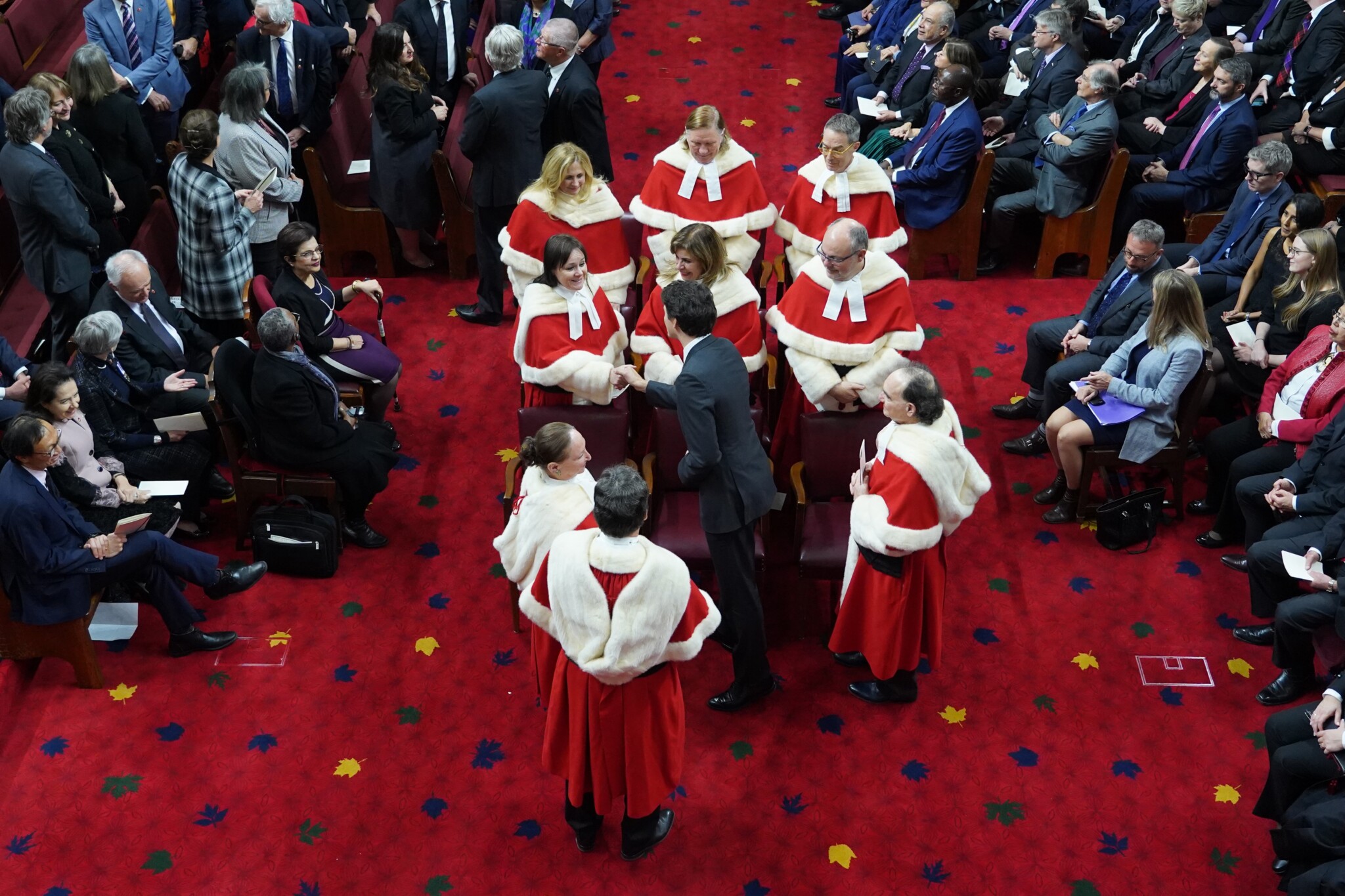The Supreme Court of Canada’s judgment in Canada (Attorney General) v. Power, released more than three weeks ago, has generated significant controversy over the proper scope of judicial power and its relation to democratic governance in Canada. As is now widely noticed, in the Power judgment, the Court held that one branch of the state (the executive branch) can be held liable for monetary compensation when another branch (the legislative branch), consisting of Parliament and the provincial legislatures, enacts unconstitutional legislation. This outcome is unprecedented in virtually all Commonwealth countries that share the Westminster model of parliamentary democracy, and it has been roundly criticized for abrogating the separation between judicial and political authority, among other issues.
The most recent contribution to this debate comes from Joanna Baron and Christine Van Geyn of the Canadian Constitution Foundation (CCF), a libertarian legal advocacy group. Writing in these pages, they defend the CCF’s decision to intervene at the Supreme Court in Power to support executive liability for legislative action. As they rightly observe, the Power judgment “has brought to the forefront a core tension” in right-leaning legal circles in Canada. But they are wrong to criticize conservatives “who have decried the decision as a radical expansion of judicial power” as “being needlessly alarmist” and insufficiently attentive to the desire for government “accountability.”
Take the claim of “alarmism” first. While the authors profess to be “skeptics of judicial power,” their own arguments belie this position. In their view, “legislative autonomy and legislative accountability are all co-equal principles.” At first glance, it may sound like a conciliatory statement. Yet this framing downplays the Court’s profoundly unconstitutional expansion of judicial power, since the correct “balancing” of these principles will be left to the courts to determine in each case.
This elevation of judicial power is demonstrated by the Power judgment itself. Under traditional Westminster principles, the parliamentary process is autonomous and immune from judicial interference, which keeps policy deliberations clear of lawfare and maintains distinct political channels of accountability. But in Power, the Court effectively abrogated these parliamentary privileges and immunities—while authorising the judiciary to determine whether and when monetary sanctions should be imposed on the executive for acts taken by the legislature. If legislative autonomy and accountability are “co-equal” under this framework, then some principles are more equal than others.
Like other defenders of the Power judgment, the authors dismiss the concern that courts have now entrenched themselves as the arbiters of the legislative process, by arguing that “the threshold to sue for an unconstitutional law” is “extremely high.” But crucially, this response overlooks the fact that the threshold still falls to be applied by an increasingly adventurous judiciary—which has, to name a few examples, given “constitutional benediction” to novel Charter rights, struck down mandatory minimums for child luring and mass murder, and diluted genuine legal protections using amorphous “Charter values.” When future Parliaments and legislators have to contemplate potential monetary sanctions for, say, taking action to reform soft-on-crime policies, can it really be claimed that concerns about the erosion of legislative autonomy are overblown? Conversely, if the legal threshold is truly so high as to be practically inaccessible, then one might ask: what is the point of this prospect of judicial accountability in the first place, other than to cast doubt on future efforts to legislate in the common good?
Just as the claim of “alarmism” falls flat, the criticism that conservatives are inattentive to “accountability” misses the mark. Those who regard the Power judgment as a grave mistake do not oppose “accountability” in the abstract. Rather, they recognise that the Westminster model of responsible government, which Canada inherited from the United Kingdom, amply provides for accountability through Parliament itself, acting in dialogue with the people. In the Westminster model, the government of the day, along with its ministers, is answerable to the House of Commons. And in turn, the House of Commons is accountable to the electorate. The remedy lies at the ballot box, not in the courts.
In contrast to Baron and Van Geyn’s claims, critics of Power simply believe that our inherited constitutional tradition is preferable to inaugurating a juristocracy. While not infallible, it is hard to see the case for allowing unelected and unaccountable judges to run roughshod over the legislative process when these mechanisms already exist. Considering the high likelihood of judicial overreach in exercising their newly claimed powers to oversee the legislative process, the case for court-centric accountability becomes even less appealing.
In this light, it is surprising that the CCF, an organisation that has often been associated with attempts to advance the “originalist” method of constitutional interpretation in Canada, should support undermining Canada’s settled constitutional arrangements in this way. After all, the plain text of the Constitution Act, 1867 states that it provides Canada “with a Constitution similar in Principle to that of the United Kingdom.” It is universally understood that this wording guarantees the Westminster model of parliamentary democracy in Canada and at the provincial level, along with the privileges, powers, and, yes—the immunities that the U.K. Parliament had in 1867. To insist on a judicial mechanism of accountability, as the CCF does, is to adopt an ahistorical and myopic view of “accountability,” which discards Canada’s constitutional inheritance and the way in which our constitutional tradition ensures robust political checks on governmental and legislative misconduct.

Prime Minister Justin Trudeau greets Supreme Court justices before the Throne Speech in the Senate chamber in Ottawa, Dec. 5, 2019. Chris Wattie/The Canadian Press.
Perhaps to ward off criticisms of Power as an activist judgment that eviscerates this constitutional inheritance, Baron and Van Geyn claim that Power was simply following the Supreme Court’s own “22-year-old precedent” in the case of Mackin v. New Brunswick. This defence is a mirage that should be dispelled. In truth, the Mackin case never considered, or even involved argument on, the proper scope of parliamentary privileges and immunities under the Constitution. Instead, Mackin suggested, in some overbroad and infelicitous phrasing, that its thresholds for awarding damages against the executive might apply to legislative acts, without any pretension to decide the issue. Indeed, it is telling that the Court in Power could not point to a single instance—in the 22 years since Mackin—where a Canadian court awarded damages solely for unconstitutional legislation. To defend its judgment as an affirmation of “precedent” is to justify the perpetuation of what is at best a legal mistake, and a departure from axiomatic precepts of the Canadian constitutional order, on a thin and tenuous reed.
To support the court-centric approach to accountability, Baron and Van Geyn invoke various examples where “Parliament has acted in bad faith and violated fundamental rights” in the past. But their examples are largely inapt. Notably, they erroneously attribute the internment of Japanese Canadians to a law “Parliament has passed,” when in fact the internment was directed by the federal Cabinet—an action of the executive branch, for which compensation might be available without eviscerating basic precepts of our Westminster constitutional tradition. In any event, their examples neglect that it is typically not the enactment of an unconstitutional law, but its actual enforcement by state agents, that causes unjustified harm. And those who are harmed by acts of enforcement—i.e., for executive, not legislative acts—could seek compensation under settled legal principles untouched by the Power judgment.
Curiously, Baron and Van Geyn also point to our Parliament’s attempts to pass bills of attainder (against serial killers Clifford Olson and Karla Homolka) to buttress the claim that compensation for unconstitutional legislation might sometimes be justified. But these bills failed due to Parliament’s own checks and procedures. In each case, the Speaker ruled that the bill of attainder was out of order, and that parliamentarians could not proceed, because this type of bill is “not known to our [parliamentary] practice” and “it has never existed in Canada.” As a result, it demonstrates the robustness of our parliamentary system, rather than its need to be stymied by judicial supervision.
So long as one accepts that the rule of law is different from the rule of courts, Power is anything but a principled judgment. It is supremely ironic that Baron and Van Geyn warn that “we operate in the real world where we are not governed by noble philosopher kings entitled to absolute immunity.” This describes the very situation Power leaves us in, with legislative processes liable to be supervised by unelected “philosopher kings” who, unlike parliamentarians, are not democratically accountable but in fact enjoy absolute immunity for judicial acts. Far from making government more accountable, then, the decision simply wrests law-making out of political, democratic control and into the judicial domain.








